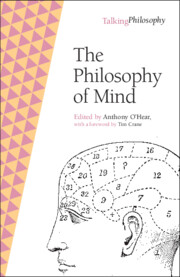Book contents
- The Philosophy of Mind
- Talking Philosophy
- The Philosophy of Mind
- Copyright page
- Contents
- Foreword
- List of Contributors
- Introduction
- The Mind–Body Problem after Fifty Years
- How to Find the Neural Correlate of Consciousness
- Embodiment and the Philosophy of Mind
- Folk Psychology and Mental Simulation
- Understanding Other Minds from the Inside
- Self-knowledge: the Wittgensteinian Legacy
- Joint Attention and the First Person
- Consciousness as Existence
- Setting Things before the Mind
- Perceptual Intentionality, Attention and Consciousness
- Experience and Reason in Perception
- Intentionality as the Mark of the Mental
- Intentionality and Interpretation
- Externalism and Norms
- Mind, World and Value
- Mind, Knowledge and Reality: Themes from Kant
- The Modality of Freedom
- Dualism in Action
- Index
Setting Things before the Mind
Published online by Cambridge University Press: 19 May 2022
- The Philosophy of Mind
- Talking Philosophy
- The Philosophy of Mind
- Copyright page
- Contents
- Foreword
- List of Contributors
- Introduction
- The Mind–Body Problem after Fifty Years
- How to Find the Neural Correlate of Consciousness
- Embodiment and the Philosophy of Mind
- Folk Psychology and Mental Simulation
- Understanding Other Minds from the Inside
- Self-knowledge: the Wittgensteinian Legacy
- Joint Attention and the First Person
- Consciousness as Existence
- Setting Things before the Mind
- Perceptual Intentionality, Attention and Consciousness
- Experience and Reason in Perception
- Intentionality as the Mark of the Mental
- Intentionality and Interpretation
- Externalism and Norms
- Mind, World and Value
- Mind, Knowledge and Reality: Themes from Kant
- The Modality of Freedom
- Dualism in Action
- Index
Summary
Listening to someone from some distance in a crowded room you may experience the following phenomenon: when looking at them speak, you may both hear and see where the source of the sounds is; but when your eyes are turned elsewhere, you may no longer be able to detect exactly where the voice must be coming from. With your eyes again fixed on the speaker, and the movement of her lips a clear sense of the source of the sound will return. This ‘ventriloquist’ effect reflects the ways in which visual cognition can dominate auditory perception. And this phenomenological observation is one that you can verify or disconfirm in your own case just by the slightest reflection on what it is like for you to listen to someone with or without visual contact with them.
- Type
- Chapter
- Information
- The Philosophy of Mind , pp. 246 - 282Publisher: Cambridge University PressPrint publication year: 2022

